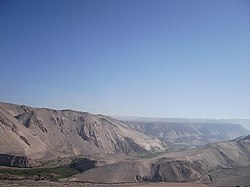Lluta River
The Lluta is a river in the Atacama Desert. It is the most northern of the great transversal Chilean rivers that start in the Andes and flow into the Pacific Ocean. It flows through the Arica y Parinacota region.
| Lluta River | |
|---|---|
 Lluta Valley as seen from Chile Route 11 | |
| Location | |
| Country | Chile |
| Physical characteristics | |
| Source | |
| - elevation | 3,900 m (12,800 ft) |
| Mouth | |
| - location | Pacific Ocean |
| Length | 147 km (91 mi) |
| Basin size | 3,400 km2 (1,300 sq mi) |
| Discharge | |
| - average | 2.3 m3/s (81 cu ft/s) |
It has a broad estuary near the port city of Arica that forms a wetland, a habitat used by many water birds (birds that live on or near water).
Geography
changeThe Lluta river has a length of 147 km (91 mi), and a drainage basin with an area of approximately 3,378 km2 (1,304 sq mi).[1][2]
Course
changeThe Lluta river starts on the Andean mountain slopes near the border with Peru and Bolivia, at an elevation of about 3,984 m (13,071 ft), in the place called Humapalca, comuna of General Lagos, Parinacota province, Arica y Parinacota.
The river is formed by the confluence of two streams:[2]
- Caracarani. It starts on the eastern side of the Tacora volcano. It has a discharge of 0.255 to 0.640 m3/s (9.0 to 22.6 cu ft/s) with an average discharge of 0.400 m3/s (14.1 cu ft/s).
- Azufre. This river is formed by several streams that come from the southwestern side of the Tacora volcano. It is around 20 km (12 mi) and a discharge of about 0.30 to 0.50 m3/s (11 to 18 cu ft/s).
Along its first 36 km (22 mi), the river flows southeast and then slowly begins to turn towards the west. In its descent to the lower elevations of the valley, the river starts to run through a canyon formed by the same river; in some parts, the canyon could be 300 m (980 ft) deep.
Near the village of Socoroma (in the comuna of Putre), the river turns directly west and, after getting out of the canyon, the river begins to widen. Near the village of Chironta, about 70 km (43 mi) from the sea, appear the first farms.
Finally, the river flows in the Pacific Ocean north of the city of Arica, in the sector Chacalluta, near the airport.
The Lluta river only flows through small villages except Putre, a small town with only 1,977 inhabitants (2022 census).
Wetland of the Lluta river
changeThe mouth of the Lluta river in the Pacific Ocean covers more of 171 hectares (423 acres). The resulting coastal wetland is the most important of its kind in the region with extensive vegetation and many water birds, including migratory birds.[1]
Main tributaries
changeBecause the Lluta river flows throug a very arid region, the Atacama desert, there are very few permanent tributaries, and most of them join the Luta by its left side; some of them are Allane, Putre, Socoroma and Colpitas.
Water quality
changeApart from its problems of salinity and acidity, the river has very high levels of boron, arsenic, and sulfate, among other pollutants, which limit the agricultural activities that can be developed along the river.[3]
Gallery
change-
The Llauta valley from the Ruta 11 road
-
Mouth of the Lluta river
-
Wetland of the Lluta river, Arica
-
A water bird in the Lluta river wetland
Related pages
changeReferences
change- ↑ 1.0 1.1 "Cuenca del río Lluta" (PDF) (in Spanish). Ministerio de Obras Públicas - Dirección General de Aguas. Archived from the original (PDF) on 11 June 2009. Retrieved 9 October 2016.
- ↑ 2.0 2.1 "Hoyas hidrográficas de Chile - Primera Región" (PDF) (in Spanish). Ministerio de Obras Públicas - Dirección General de Aguas. Archived from the original (PDF) on 11 April 2016. Retrieved 10 October 2016.
- ↑ "Lluta River, Chile". NASA Earth Observatory. Retrieved 10 October 2016.
Other websites
change- Cuenca del río Lluta Archived 2009-06-11 at the Wayback Machine (in Spanish)